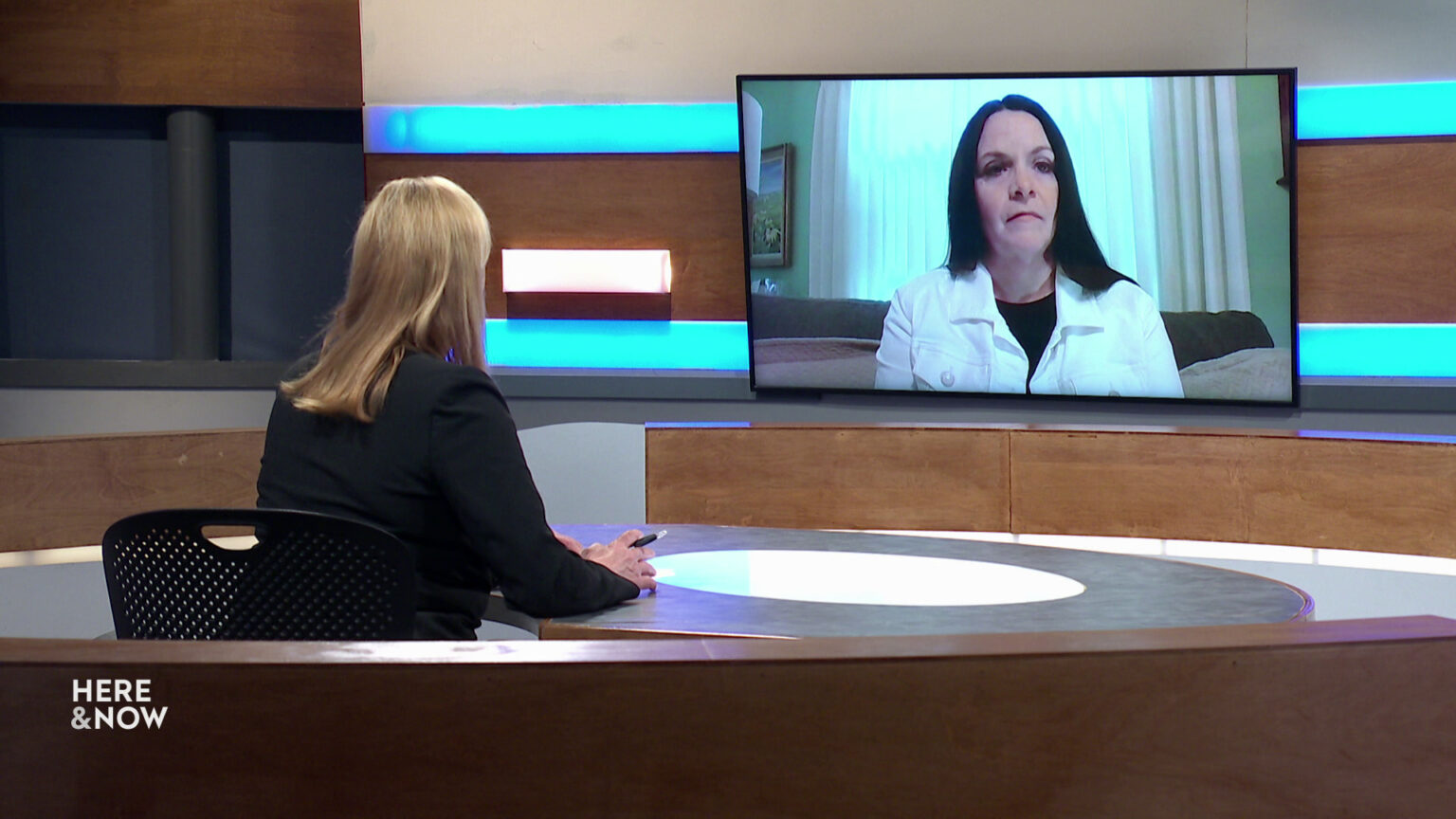'Here & Now' Highlights: Douglas McLeod, William Gardner, Jane Graham Jennings, Dr. Julie Owen
Here's what guests on the May 10, 2024 episode said about campus protests over Gaza, decriminalizing cannabis on Ho-Chunk Nation lands, falling federal funding for crime victim services, and the disputed diagnosis of "excited delirium."
By Frederica Freyberg | Here & Now
May 13, 2024

Frederica Freyberg and Dr. Julie Owen (Credit: PBS Wisconsin)
As protesters dismantled their tent encampment at UW-Madison after reaching an accord with university administration, journalism professor Douglas McCleod discussed the impact of campus protests. The Ho-Chunk Nation Legislature voted to decriminalize cannabis, and the tribal government Attorney General William Gardner said this action was with an eye toward developing the marijuana industry. A precipitous drop in federal funding for crime victim services leads advocates like Jane Graham Jennings, executive director of the Women’s Community in Wausau, to warn the situation is dire for their work. FRONTLINE investigated police use of force after diagnosing a suspect as in the throes of “excited delirium,” prompting a discussion with Medical College of Wisconsin psychiatrist Dr. Julie Owen, who said that diagnosis is disputed and medically controversial.
Douglas McCleod
Professor, UW-Madison School of Journalism and Mass Communication
- Just before graduation weekend, pro-Palestinian protesters on the UW-Madison campus reached an accord with the university administration over their demands and agreed to remove an encampment that had been in place since April 30. As part of the agreement, university administration scheduled a meeting for representatives from the Students for Justice in Palestine at UW-Madison group to meet with officials from the University of Wisconsin Foundation and Wisconsin Alumni Association to discuss investment portfolios as they relate to Israel-based companies. McCleod studies social protest and media, and said often reporting on these issues typically focuses on what he called the status quo.
- McCleod: “You can kind of see some of the dangers right now in the current protests. There’s been a lot of attention on police actions on campuses around the country — a lot of attention to encampments being removed. A lot of attention to clashes between protesters and counterprotesters, but not much mainstream news coverage is really explaining, ‘What’s this protest all about, what’s going on in Gaza, and how are the protesters trying to effect change when it comes to that particular issue?'”
William Gardner
Attorney General, Ho-Chunk Nation Department of Justice
- The Ho-Chunk Nation Legislature voted to decriminalize cannabis on its lands. Gardner said this action came with an eye toward the future.
- Gardner: “In 2015, the General Council got together and made a request that the Legislature consider and research moving into the marijuana field in the sense of what can they do for economic expansion … and in an effort to put the Nation in the best possible position once and if any form of legalization occurred. So, it’s all been positioning, and this is, for the most part, groundwork.”
Jane Graham Jennings
Executive Director, The Women’s Community
- A 70% drop in federal Crime Victims Fund grants to states that is expected starting Oct. 1 means that agencies and organizations that provide services to victims of sexual assault or domestic violence have to curtail some of that help. Graham Jennings said her Wausau-based organization stands to lose more than $225,000.
- Graham Jennings: “One thing that people are most familiar with is our shelter service. That’s a place where people who are in violent situations, trying to flee to move into safe housing, can stay with us for a short time in an emergency shelter. That’s going to be impacted drastically by funding cuts.”
Dr. Julie Owen
Psychiatrist, Medical College of Wisconsin
- A FRONTLINE investigation into law enforcement tactics — including its “Documenting Police Use of Force” documentary and online reporting produced in collaboration with the AP — examined the use of injected sedatives on arrest subjects who are labeled by officers and other first responders as in the throes of “excited delirium.” It is purportedly marked by agitation, high pain tolerance and superhuman strength. Experts call the diagnosis of excited delirium “deeply flawed” and built on racial stereotypes. Dr. Owen said the concept of excited delirium is disputed and should not be used to justify the dangerous use of pre-hospital medications to subdue subjects.
- Owen: “As a physician and, and as a physician who practices in solely emergent or acute settings, this sort of case is hard for somebody like myself to try to get to the bottom of. When you have folks who don’t have the same amount of clinical training, sort-of throwing out terms that sound like diagnoses to then drive interventions, with questionable safety involved, and of course, when these interventions result in lethal outcomes, when really that’s probably not necessary. That is disturbing.”
Watch new episodes of Here & Now at 7:30 p.m. on Fridays.
 Passport
Passport











Follow Us